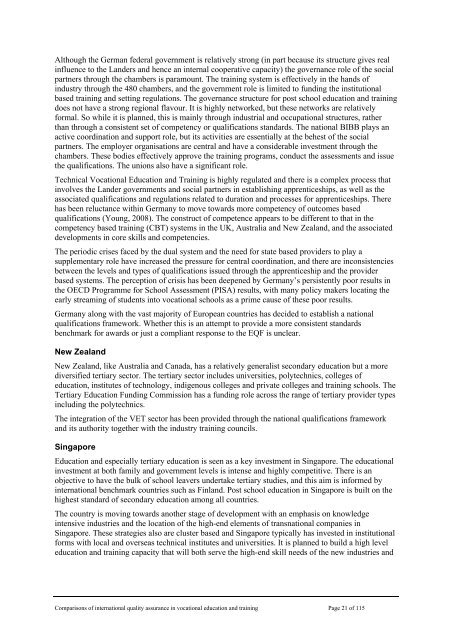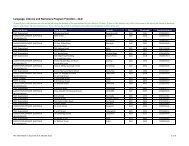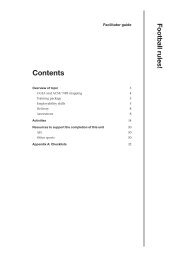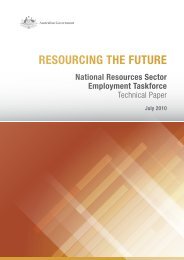Review - Department of Innovation, Industry, Science and Research
Review - Department of Innovation, Industry, Science and Research
Review - Department of Innovation, Industry, Science and Research
Create successful ePaper yourself
Turn your PDF publications into a flip-book with our unique Google optimized e-Paper software.
Although the German federal government is relatively strong (in part because its structure gives real<br />
influence to the L<strong>and</strong>ers <strong>and</strong> hence an internal cooperative capacity) the governance role <strong>of</strong> the social<br />
partners through the chambers is paramount. The training system is effectively in the h<strong>and</strong>s <strong>of</strong><br />
industry through the 480 chambers, <strong>and</strong> the government role is limited to funding the institutional<br />
based training <strong>and</strong> setting regulations. The governance structure for post school education <strong>and</strong> training<br />
does not have a strong regional flavour. It is highly networked, but these networks are relatively<br />
formal. So while it is planned, this is mainly through industrial <strong>and</strong> occupational structures, rather<br />
than through a consistent set <strong>of</strong> competency or qualifications st<strong>and</strong>ards. The national BIBB plays an<br />
active coordination <strong>and</strong> support role, but its activities are essentially at the behest <strong>of</strong> the social<br />
partners. The employer organisations are central <strong>and</strong> have a considerable investment through the<br />
chambers. These bodies effectively approve the training programs, conduct the assessments <strong>and</strong> issue<br />
the qualifications. The unions also have a significant role.<br />
Technical Vocational Education <strong>and</strong> Training is highly regulated <strong>and</strong> there is a complex process that<br />
involves the L<strong>and</strong>er governments <strong>and</strong> social partners in establishing apprenticeships, as well as the<br />
associated qualifications <strong>and</strong> regulations related to duration <strong>and</strong> processes for apprenticeships. There<br />
has been reluctance within Germany to move towards more competency <strong>of</strong> outcomes based<br />
qualifications (Young, 2008). The construct <strong>of</strong> competence appears to be different to that in the<br />
competency based training (CBT) systems in the UK, Australia <strong>and</strong> New Zeal<strong>and</strong>, <strong>and</strong> the associated<br />
developments in core skills <strong>and</strong> competencies.<br />
The periodic crises faced by the dual system <strong>and</strong> the need for state based providers to play a<br />
supplementary role have increased the pressure for central coordination, <strong>and</strong> there are inconsistencies<br />
between the levels <strong>and</strong> types <strong>of</strong> qualifications issued through the apprenticeship <strong>and</strong> the provider<br />
based systems. The perception <strong>of</strong> crisis has been deepened by Germany’s persistently poor results in<br />
the OECD Programme for School Assessment (PISA) results, with many policy makers locating the<br />
early streaming <strong>of</strong> students into vocational schools as a prime cause <strong>of</strong> these poor results.<br />
Germany along with the vast majority <strong>of</strong> European countries has decided to establish a national<br />
qualifications framework. Whether this is an attempt to provide a more consistent st<strong>and</strong>ards<br />
benchmark for awards or just a compliant response to the EQF is unclear.<br />
New Zeal<strong>and</strong><br />
New Zeal<strong>and</strong>, like Australia <strong>and</strong> Canada, has a relatively generalist secondary education but a more<br />
diversified tertiary sector. The tertiary sector includes universities, polytechnics, colleges <strong>of</strong><br />
education, institutes <strong>of</strong> technology, indigenous colleges <strong>and</strong> private colleges <strong>and</strong> training schools. The<br />
Tertiary Education Funding Commission has a funding role across the range <strong>of</strong> tertiary provider types<br />
including the polytechnics.<br />
The integration <strong>of</strong> the VET sector has been provided through the national qualifications framework<br />
<strong>and</strong> its authority together with the industry training councils.<br />
Singapore<br />
Education <strong>and</strong> especially tertiary education is seen as a key investment in Singapore. The educational<br />
investment at both family <strong>and</strong> government levels is intense <strong>and</strong> highly competitive. There is an<br />
objective to have the bulk <strong>of</strong> school leavers undertake tertiary studies, <strong>and</strong> this aim is informed by<br />
international benchmark countries such as Finl<strong>and</strong>. Post school education in Singapore is built on the<br />
highest st<strong>and</strong>ard <strong>of</strong> secondary education among all countries.<br />
The country is moving towards another stage <strong>of</strong> development with an emphasis on knowledge<br />
intensive industries <strong>and</strong> the location <strong>of</strong> the high-end elements <strong>of</strong> transnational companies in<br />
Singapore. These strategies also are cluster based <strong>and</strong> Singapore typically has invested in institutional<br />
forms with local <strong>and</strong> overseas technical institutes <strong>and</strong> universities. It is planned to build a high level<br />
education <strong>and</strong> training capacity that will both serve the high-end skill needs <strong>of</strong> the new industries <strong>and</strong><br />
Comparisons <strong>of</strong> international quality assurance in vocational education <strong>and</strong> training Page 21 <strong>of</strong> 115
















